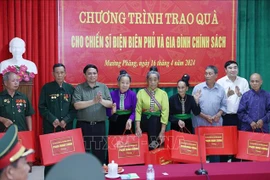 Chairman of the Committee for External Relations of Saint Petersburg Evgeny Grigoriev (R) at an interview with Vietnam News Agency (Photo: VNA)
Chairman of the Committee for External Relations of Saint Petersburg Evgeny Grigoriev (R) at an interview with Vietnam News Agency (Photo: VNA)Recalling memories of his meeting with General Vo NguyenGiap - the top commander of the Dien Bien Phu battle - while joining a youthdelegation to Vietnam in the 1990s, Grigoriev said that General Giap repeatedlymentioned the power of will.
An army without tanks defeated a modern one with an airforce, and this can only be explained by the power of will, said the Russianofficial, holding that the Dien Bien Phu Victory shows that there is nodifficulty that cannot be overcome if there is determination and will.
Grigoriev pointed out that the spirit of the victorywas continued in the Ho Chi Minh Campaign in 1975. At that time, Vietnamesesoldiers used bicycles to transport and even carried on their backs weapons andsupplies to southern battlefield through the Ho Chi Minh trail, he noted, calling this unthinkable and a strength that helped Vietnam win the war.
The Russian official compared the Dien Bien Phu battle with Battleof Stalingrad (1942-1943) in the great national defence war of the formerSoviet Union (now Russia), during which residents of the city overcame hundredsof days and nights of blockade to defeat the fascist army, creating a turningpoint in the war. Grigoriev underlined that the national will is a decisivefactor for victory in any battle.
Another lesson from the Dien Bien Phu Victory, held Grigoriev, is internationalism. The victory was a great encouragement for peoples, especiallyneighbouring countries, to stand up for independence, firmly believing in thepower of will and desire for independence in the fight against colonialism.
Grigoriev said he was deeply impressed by Giap who had a gentle look like a farmer and was the one who commanded the preparation and then achieved the famous victory in 1954. The Russianofficial said that when he studied more deeply about the general, heunderstood that he had met a person who dedicated his whole life to fightingfor the interests of the Fatherland and the people.
He said that he has always remembers General Giap’s saying that there are limits inmilitary and economics, but no in human relations andsentiments among the people./.




























